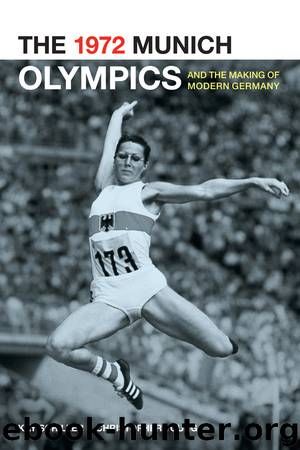The 1972 Munich Olympics and the Making of Modern Germany by Young Chris Schiller Kay

Author:Young, Chris, Schiller, Kay
Language: eng
Format: epub
Publisher: University of California Press
Published: 2012-01-22T16:00:00+00:00
THE MUNICH OLYMPICS IN THE AGE OF OSTPOLITIK
From late 1968 onward, the mercury began to fall. Pressed again by Brundage and Daume, the cabinet finally agreed to supply the IOC with a letter before the end of the year.135 It still balked at lifting the 1959 restrictions on the GDR flag, despite strong encouragement to do so by the interior ministers of the Länder136 and vocal agitation from many MPs.137 Notwithstanding some minor governmental triumphs at sports events, the interior ministers had pressed their case further by June 1969, and NATO relaxed its regulations. Thus, long after they had in any case become ineffectual, the final impediments to the smooth running of international meets were removed. The government could do little but echo NATO’s guidelines and permit the organizers of events in West Germany to fly their rival’s flag if required to do so by their federation.138 When Brandt came to power that year, there was little more to do. In the short term, the new chancellor and his secretary of state, Egon Bahr, “found it expedient” to continue Hallstein generally.139 But in March 1970, they acceded to the Länder’s wishes by lifting the 1959 restrictions and instructing their embassies—albeit without public announcement—to take no further steps against insignia at sports events, trade fairs, and exhibitions.140
Three years before the Munich Olympics, therefore, a particular phase of Cold War feuding drew to a close. But a new one simply took its place. The GDR might have won the flag wars, but Munich provided a unique opportunity for both Germanys to transmit particular messages to the world. While the West Germans had to attend to the Herculean task of hosting the most modern Games in Olympic history, their Eastern counterparts could focus on a local ideological derby. In contrast to the period up to 1969, sport and politics in the Federal Republic largely pulled together.141 Sport saw itself as contributing to Ostpolitik, while the government fostered greater athletic contact with the Eastern bloc.142 However, since the sports-political apparatus across the border was raising its game, there would be much for both to absorb and deflect.
The GDR was to pursue two goals at Munich: the establishment and increase of its own status, and the prevention of the Federal Republic’s attempts to do the same. It was to enjoy the party to the full while simultaneously destroying it for the hosts. The first aim had been broadly met by the IOC’s decision in Mexico. It was to be completed by the vigorous production of medal-winning athletes (a subject about which much has been written already).143 Having humiliated the Federal Republic on the track in Mexico, coming in fifth to its eighth, East Germany continued its meteoric rise in world sport via a system of talent-spotting and drug-fuelled training programs. It placed third at Munich and second four years later in Montreal, ahead of the United States. As widely signaled in the Eastern press, in 1972 the GDR intended to “let the West pay for the Games while getting on with winning them themselves.
Download
This site does not store any files on its server. We only index and link to content provided by other sites. Please contact the content providers to delete copyright contents if any and email us, we'll remove relevant links or contents immediately.
Fanny Burney by Claire Harman(26597)
Empire of the Sikhs by Patwant Singh(23072)
Out of India by Michael Foss(16848)
Leonardo da Vinci by Walter Isaacson(13316)
Small Great Things by Jodi Picoult(7121)
The Six Wives Of Henry VIII (WOMEN IN HISTORY) by Fraser Antonia(5496)
The Wind in My Hair by Masih Alinejad(5091)
A Higher Loyalty: Truth, Lies, and Leadership by James Comey(4954)
The Crown by Robert Lacey(4806)
The Lonely City by Olivia Laing(4798)
Millionaire: The Philanderer, Gambler, and Duelist Who Invented Modern Finance by Janet Gleeson(4465)
The Iron Duke by The Iron Duke(4349)
Papillon (English) by Henri Charrière(4262)
Sticky Fingers by Joe Hagan(4188)
Joan of Arc by Mary Gordon(4100)
Alive: The Story of the Andes Survivors by Piers Paul Read(4018)
Stalin by Stephen Kotkin(3957)
Aleister Crowley: The Biography by Tobias Churton(3634)
Ants Among Elephants by Sujatha Gidla(3460)
